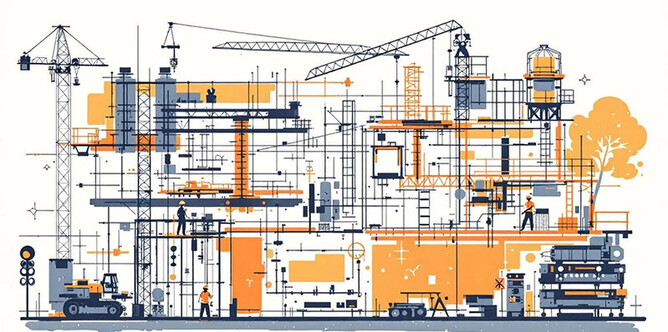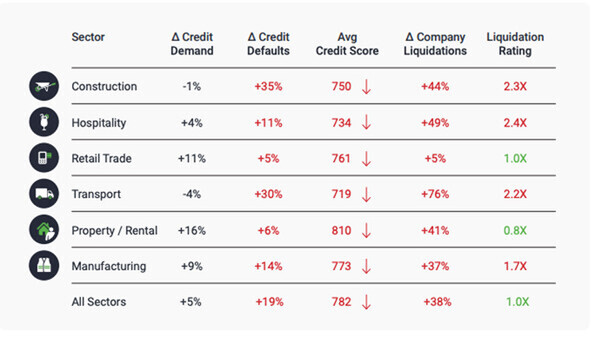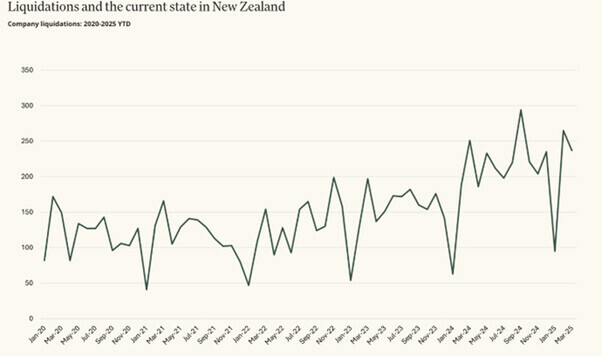Despite talks of recovery in the construction sector, many construction companies are still feeling the effects of an economic downturn.
According to Centrix's March Credit Indicator Report, business liquidations increased 37% over the past year. Meanwhile, Companies Office reports that 597 companies were placed into liquidation from January to March 2025 alone.
Source: Centrix – Credit Bureau of New Zealand
The table above shows ‘year-on-year‘ comparisons using 12-month rolling averages.
Liquidation rating is the proportion of liquidations divided by the proportion of businesses in a given sector.
Company defaults had increased across all sectors YoY, with construction and transport recording the highest default increase at +35% and +30%, respectively. Reports show that rising material costs and stalled projects following the change in government have all contributed to the increased construction liquidations.
Source: New Zealand Companies Office
In September 2024, Centrix also reported that:
546 construction companies had been liquidated in the past 12 months
Construction companies make up 12% of all registered companies across NZ, but account for 26% of liquidations
Non-residential construction firms reported a 78% increase in liquidations since 2023.
How construction businesses can stay protected
According to Anthony Harper, a leading New Zealand law firm, construction companies can take various strategic measures to secure their business. One of them includes understanding the Construction Contracts Act 2002 (CCA).
The law firm states that the CCA provides useful tools that can help construction companies ensure timely payments, security of retentions, and resolve disputes cost-effectively.
Timely payments
CCA has a progress payment provision that can be beneficial for contractors who want to ensure they receive timely payments. Anthony Harper suggests that all construction contractors should conduct due diligence so that their invoices comply with their construction contract and the CCA.
Construction companies can enforce payment on those who fail to pay on time, which gives them the right to suspend work until payment is made.
Security of retentions
There have been recent changes to the retention provisions in the CCA, which give more protection for parties with amounts retained in commercial construction contracts. This includes having the retention money held on trust in a separate bank account and keeping proper records (for parties holding the retention money).
Anthony Harper reiterates that parties who have retentions withheld from their payments must ensure they are regularly updated and should ask to inspect all records if they have concerns.
Dispute resolution
Disputes in construction contracts are common, and construction companies should resolve them as soon as possible to ensure they don’t affect cash flow. Companies experiencing difficulties in resolving their disputes should consider adjudication under the CCA, as it can be a more informal process compared to formal court proceedings.
How construction companies can address financial issues
So, what can you do if your construction business is in trouble? The legal professionals offer several suggestions.
IRD Payments
Construction businesses that are falling behind on their payments to the Inland Revenue Department should not delay or ignore warnings. This may lead to further financial pressures and could put the company at risk of liquidation. Instead, speak with the IRD as soon as possible.
Debt Collection
Construction companies can take legal action to recover their debts, assuming there’s no dispute. If the debtor is an individual, consider filing a legal proceeding in court. Meanwhile, corporate entities can be issued a statutory demand to initiate liquidation proceedings.
According to Anthony Harper, these legal proceedings will allow construction businesses to enforce judgments against the debtor and possibly recover their payments.
Debt Payment
The firm advises companies to seek legal advice if they are unable to pay their debt. Company directors have a legal obligation for company debts under the Companies Act 1993, and with good advice, they can mitigate losses and even recover their business while continuing to trade.
Key takeaway
Risks are an inevitable part of business. While construction companies cannot avoid uncertainty, there are fortunately many strategies available to mitigate risk. Financial prudence, understanding your obligations as a business, and securing your projects remain the best approach.
Bonded NZ helps builders and contractors find the best insurance, warranties, and surety bonds that keep their best interests in mind. Whether it's a big or small project, our cost-effective options help them secure their projects at every angle.
For more information about our services, contact our team today.


